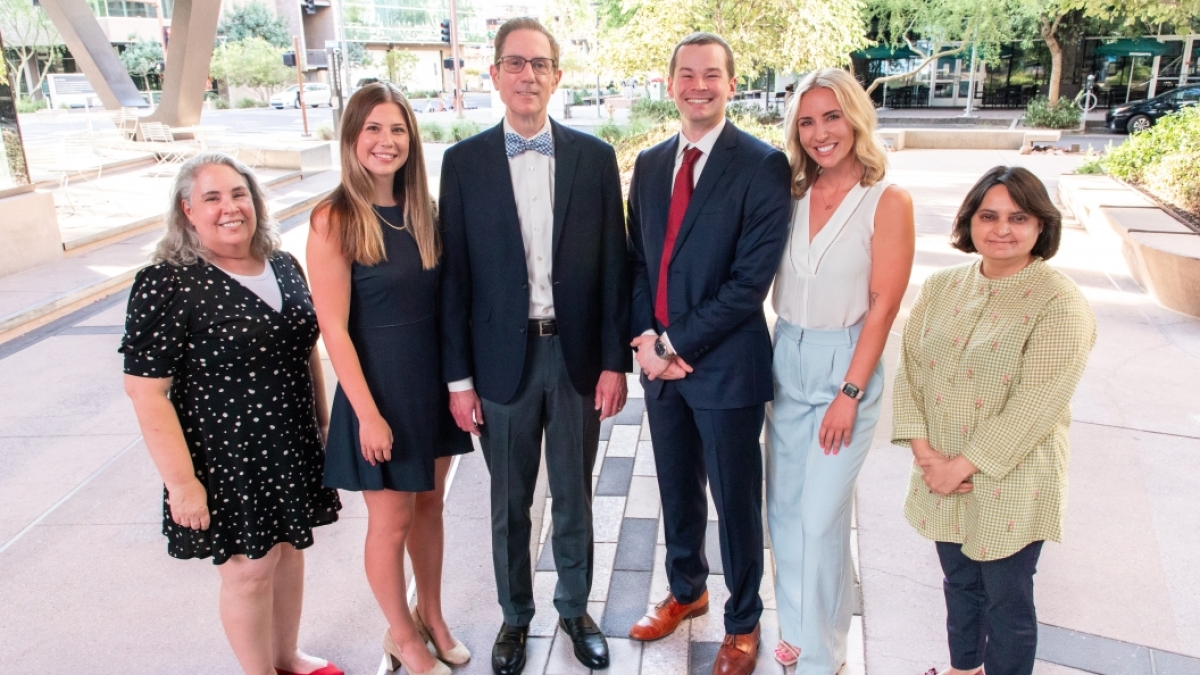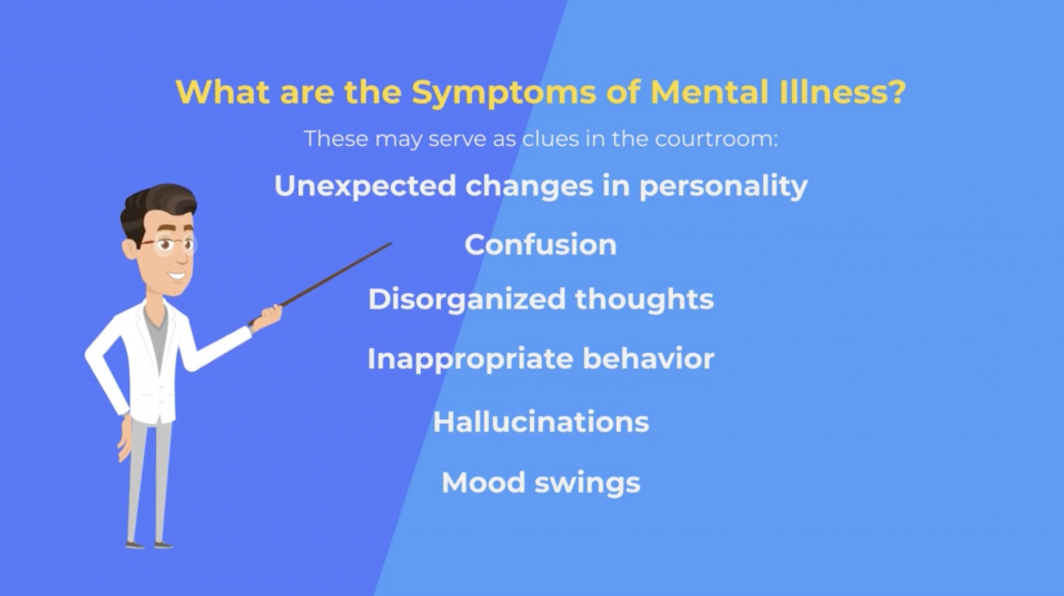Law, medicine intersect in new mental health training for judges

A group of doctors from Mayo Clinic in Phoenix and students at the Sandra Day O’Connor College of Law at Arizona State University worked together with legal professionals to create mental health training modules for judges in Arizona. From left to right: Patricia Starr, Zuzana Skarkova, Dr. Robert Bright, John Klyver, Nicole Kazan and Dr. Shweta Kapoor. Photo by Tabbs Mosier/Arizona State University
Editor’s note: This story is featured in the 2023 year in review.
On the surface, there might not appear to be many similarities between law and medicine.
However, a deeper look reveals both disciplines draw intellectually curious, focused people who have the desire to help others — often at the most vulnerable points of their lives. The work can be strenuous and emotionally taxing.
Knowing this, a group of ASU Law alums are hoping a new training program they developed will help prepare judges and attorneys to better handle mental health issues in and around their work. The program aims to teach compassion in dealing with those suffering from mental health issues and encourage judges to care for themselves when faced with trauma in the courtroom.
“Judges have very little to no training in mental illness and mental health,” said Patricia Starr, a Maricopa County Superior Court judge who inspired the program and participated in editing and narrating. “… Yet in every department in our court, we have litigants who have suffered trauma or are living with a mental illness. We also deal with attorneys, staff, crime victims and others with the same challenges. We are also exposed to secondary trauma, or even firsthand trauma on a regular basis.”
Where law and medicine collide
The idea for the training program came about in 2021 when John Klyver, a student in the dual Juris Doctor and Medical Degree program offered through a partnership between the Sandra Day O'Connor College of Law at Arizona State University and the Mayo Clinic Alix School of Medicine in Phoenix, attended a talk on mental health and the law given by Starr.
Klyver had previously worked in public health in rural Haiti and saw how often law and policy interacted with the health field.
“Much of what I saw while working in Haiti was how difficult it could be to get community health stakeholders onto the same page,” he said. “There's a large transdisciplinary element to global health work, making policy decisions with very limited resources. Medical decisions require medical knowledge, but advocacy and political realities are just as important to effective care. I saw the dual degree as a pathway to better advocate for and support community-led health projects around the world."
After Starr’s talk, Klyver and then Master of Legal Studies student Nicole Kazan began to discuss what judges face when handling mental health issues in the court system. Kazan, who now works at Solari, Arizona’s suicide hotline, had a master's degree in social work and had previously been a social worker. She had seen firsthand how often medical professionals, lawyers and judges have to conduct their own social work in cases without the proper training to do so.
“Mental health is so important to everyone, but especially in careers that are demanding and complex, and you take on a lot of people's problems when you work on cases,” she said. “I just think it's critical to be able to check in with oneself and have access to support and what people need.”
Along with fellow ASU student Zuzana Skarkova on board to handle animationThe animation was overseen by Skarkova and created by a group of ASU undergraduate student interns. , Klyver and Kazan formed a team and began work on the educational mental health modules for judges in Arizona. The team eventually grew to include Starr, Judge Bruce Cohen and Dr. Robert Bright and Dr. Shweta Kapoor, both with the Mayo Clinic at the time.
A new training program developed by ASU students, legal professionals and Mayo Clinic doctors will help prepare judges and attorneys to better handle mental health issues in and around their work. The program's training modules aim to teach compassion in dealing with those suffering from mental health issues and encourage judges to care for themselves when faced with trauma in the courtroom. Photo courtesy the Sandra Day O’Connor College of Law
Eighteen months of work later, the team had developed five researched, animated and narrated modules designed to assist members of the court in identifying and understanding the impact of their work on the mental health of themselves and others.
Module One introduces mental health diagnoses and common terms used in their study. Module Two focuses on how diagnoses may present in the courtroom. Module Three discusses social work, including de-escalation techniques and how to respond to someone having a mental health episode. Module Four centers on identifying judges' triggers and regulating their emotions. The fifth and final module looks at vicarious trauma, or the emotions that can result from exposure to other people’s trauma, and how that can present among judges working with intense cases.
Initially intended for Maricopa County mental health court judges, the training modules are now available to judges throughout Arizona and across the country.
Future expansion
Going forward, the team hopes to expand the program to more professional groups, especially as mental health becomes less stigmatized.
Kapoor, who now works at the Carl T. Hayden Veterans’ Administration Medical Center and recently launched her own pyschotherapeutic practice, Kalm Psychiatry, spoke to the inclination of those in the medical field to forsake their own mental health in the interest of maintaining that of their patients.
“Many of us become so focused on the well-being of our patients … we forget we are individuals as well with emotional needs and finite emotional resources,” she said. “… by normalizing emotional reactions, encouraging more self-reflection, honoring our own humanity, and recognizing our emotional pain points, physicians, judges and lawyers can become so much more effective, with much less burnout and distress.”
Kapoor became involved in the development of Module Four on emotional regulation, but she became so invested in the project that she elected to stay on until it was finished.
“It’s OK to be a human while being a physician or a judge or a lawyer; these are not mutually exclusive. In fact, our humanity enriches our professional work by bringing in more compassion and empathy,” she said. “Our humanity is actually our biggest strength.”
More Law, journalism and politics

Exhibit uses rare memorabilia to illustrate evolution of US presidential campaigns
After one of the most contentious elections in history, a new museum exhibit offers a historical perspective on the centuries-old…

TechTainment conference explores the crossroads of law, technology, entertainment
What protections do writers, actors, producers and others have from AI? Will changing laws around name, image and likeness (…

How to watch an election
Every election night, adrenaline pumps through newsrooms across the country as journalists take the pulse of democracy. We…
